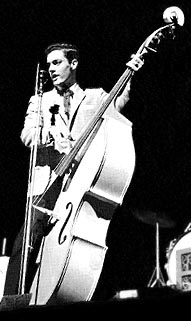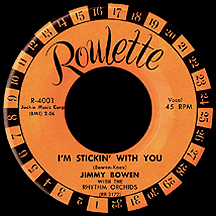JIMMY BOWEN
I'm Stickin' With You
The Rhythm Orchids came into being in the northern Texas town of Dumas around 1955, at first calling themselves The Serenaders. Guitarists Buddy Knox and Don Lanier and bassist Jimmy Bowen were playing mostly country music in those days. A couple of years later, with rock and roll in full bloom, the guys changed their name to The Orchids (probably unaware of the Chicago doo wop group of the same name recording at the time for Parrot Records), patterning their sound on the unlikely combination of R&B's Hank Ballard and C&W's Hank Williams. In 1956, they recorded two songs at the Norman Petty studios in faraway (well, 150 miles or so) Clovis, New Mexico (where Buddy Holly and The Crickets would later wax their greatest tracks). Dave Alldred (later of Dickey Doo and the Don'ts) was added as drummer and the results were clearly more formulaic than what the rockin' cats at Sun Records in Memphis were turning out. But something went right that day in Clovis - these songs were hits!
A self-released single came out of the session, with "Party Doll" on one side (credited to Buddy Knox with the Orchids) and "I'm Stickin' With You" on the other (credited to Jim Bowen with the Orchids). They named the label Triple-D (after KDDD, a local Dumas radio station). Another session in early 1957 resulted in one additional song by each singer. Before long Roulette Records had picked up the Triple-D single for national distribution, trying an unusual tactic with what they perceived as two A sides: the records were released separately (Jimmy's on Roulette 4001 and Buddy's on Roulette 4002) with the newer recordings on the B sides. Roulette promoted the singers as separate acts, but with the revised name The Rhythm Orchids identified as the backing group on both records (George Goldner and his label staff were most certainly aware of the other Orchids group). Both records hit the charts the same week in February 1957; Jimmy's optimistic, simplistic "Stickin'" ('be bop, I love-a you baby') hit the top 20, while Buddy's "Doll" soared to number one (Holly, the other Buddy, would once again follow their lead, reaching even greater heights with separate records under the Crickets' name and his own, the main difference being that Holly was the singer on every song, while the Rhythm Orchids records stayed with the separate leads).
"Ever Lovin' Fingers," the Roulette single's darker side is, for my money, the best of Bowen's songs, a stripped-down vocal, guitar and drum piece with lyrics throwing doubt as to the trustworthiness of women ('...the first thing I knew when my back was turned, got my ever lovin' fingers burned'). Bowen's lament is straightforward and cutting; the song hit the charts in its own right. As a recording act he wasn't as successful as Buddy Knox, who enjoyed a run of hits until 1961. Just two of Jimmy's subsequent releases were marginally successful: the spring '57 follow-up, "Warm Up to Me Baby," was similar in sound and texture to "I'm Stickin'," but the next three singles dropped out of sight and things were looking bleak, until he went the old-fashioned route. "By the Light of the Silvery Moon," a song written by Gus Edwards and Edward Madden, had first been a hit by Billy Murray and the Haydn Quintet in 1910. Bowen's twangy, midtempo interpretation had a mid-chart run in the summer of 1958. Staying on the Roulette roster until 1960, he released singles after that on the Crest and Capehart labels, eventually realizing that if he wanted to stay in the music business it wouldn't necessarily be as a singer. He admitted that even the girls in the audience at his shows had long since stopped screaming and started listening. Around 1962 he switched gears.

A position at Chancellor Records opened up, giving him a chance to produce other artists and do some songwriting. Frank Sinatra had founded Reprise Records in 1960 as a pop and jazz outlet, with many older-skewing '50s hitmakers on the roster including his Vegas pals from the Rat Pack. By '62 or '63, these artists were underperforming against the dominant rock and teen acts of the day and Frank was looking to branch out. Jimmy happened to be in the right place at the right time, hired for producing and A&R, suddenly finding himself in a position to see if he could come up with some contemporary hits for the label. He brought in top-notch session man Ernie Freeman and they set to the task, getting things in gear with a top 40 instrumental hit, "The Lonely Surfer" by Jack Nitzsche. There were misfires early on as Bowen also set out to revive Thurston Harris's career, put out a couple of singles of his own and signed old buddy Buddy for four singles in 1965 and '66. Despite some fine work, none of these projects connected. He was associated with one other 1950s act who signed with Reprise in the '60s, but his involvement with her was a bit more personal.
Keely Smith joined Louis Prima's band in the late 1940s (while Jimmy Bowen was just a junior high schooler in Dumas). Louis and Keely were married from 1953 to 1961, during which time they were a hot live act and had several hits including "Oh Babe!" in 1950 and "That Old Black Magic" in 1958. She and Sinatra spent time in the studio as well ("How Are Ya' Fixed For Love?" was a minor hit in '58). A couple of years after her divorce from Prima, she joined Reprise. A couple of years after that, she and Bowen walked down the aisle.
In mid-1960s, Jimmy Bowen was one of the hottest producers in the business. He had gained Sinatra's respect and trust by this time and was given a chance to apply his talents to the older Reprise artists in the hopes of getting them back into the upper reaches of the charts. Jimmy's savvy '60s sense worked wonders for the label over the next few years. He took control of Dean Martin's fate, the result being a number one hit for Dino in the summer of '64, "Everybody Loves Somebody," with many big hits to follow. Producing the Chairman of the Board was more of a challenge; he basically experimented with whatever he thought might work at any given moment. Not every record clicked, but with "Strangers in the Night" Frank Sinatra, and Bowen, struck an oil well. A number one hit in July 1966, it went on to win the Grammy for Record of the Year. More Bowen-Sinatra collaborations ensued, including another '66 top ten, "That's Life." Sammy Davis Jr. rode the hot streak as well with several Bowen productions including Sammy's biggest hit of the decade, "I've Gotta Be Me," in 1969.
Jimmy and Keely divorced in 1969, about the time he left Reprise and started his own label, Amos Records. Returning to country music, much-changed since his early days with Knox and the Orchids, he became an executive at a series of record labels, including Capitol, MGM and MCA, a key player over the years in the careers of Reba McEntire, George Strait and others. During his time as president of Capitol Nashville (later Liberty Records) in the 1990s, Garth Brooks rose to prominence, and the clash of wills between the two put a cramp in Bowen's career (while Garth's controlling demands led to the downfall of the company). Jimmy Bowen departed the label a multimillionaire, in all probability making him the wealthiest, in the long run, of all 1950s rock and roll acts west of Tupelo, Mississippi.


